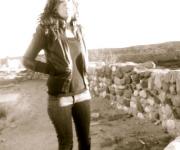To all of my creative writing professors, I have a confession: I’ve never finished reading any of the travel pieces that you’ve assigned.
I began each one with the best of intentions, and objectively I admired the various authors’ tight construction and vivid description. But while strong writing typically pulls me closer with each paragraph, travel essays hold me at an unbending arm’s length from both the subject and the narrator. The only effect that travel writing has ever had on me is a selfish restlessness to discover how a certain city might look through my eyes and sound in my ear.
So finally, last April, I decided to find out.

As we began our descent into Paros, the flight attendant passed around a basket of hard candies. I picked a peppermint, and before it had fully dissolved on my tongue, we landed with a bump and a skid. The eight other passengers and I filed out onto a tiny airstrip scattered with hazy slices of morning light. Dazed, I had no idea what to do next. Weeks before, when I asked the program coordinator for the House of Literature’s address, I had received no response.
I approached a group of older men huddled in the parking lot.
One of them looked up. “Taxi?” he asked.
“House of Literature?” I replied.
He nodded, smiled, and grabbed my bag.
Moments later, we were speeding up winding mountain roads. Whenever Antonis the cabdriver neared a sharp curve, he honked twice without slowing. Speed limit signs written in kilometers per hour zipped past my window. The dusty dashboard consoles displayed the hour in military time and the temperature in degrees Celsius. The water bottle trembling on the seat beside me was marked in milliliters. My wallet was full of euros. Interpreting anything around me required that I convert foreign units of scale. Instead, I leaned back in my seat and stared out the window at the mountainsides dusted with poppies, goats, lemon trees, and olive trees, and beyond it all, the sea.
The European Translation Centre of Literature and Human Science (EKEMEL) has thirteen outposts that offer “hospitality to writers and translators from all over the world.” The one I attended on Paros was housed in a sprawling former hotel in the village of Lefkes, which during the off-season (October through Easter) is practically uninhabited. At the House of Literature—usually shortened to the “Spiti,” the Greek word for house—accepted writers and translators paying ten to fifteen euros per night to write and live undisturbed for a maximum of thirty days. All residents have full access to the kitchen, library, laundry room, courtyards, and unreliable wireless Internet—and the roof, where you can find a sunny alcove sheltered from the relentless island wind.
Katerina, a village woman with a round face, thick hair, and a girlish laugh, cleans the house every other day and brings fresh sheets and towels to each room. When, on my last day, I tried to express to Katerina how much I appreciated all that she did, she beamed and said in halting English, “You pay me back with your love for me.”
Dinner at the Spiti started at 9:00 p.m.. On that first night, I came downstairs to the dining room and met a silver-haired Athenian playwright who always wore black and was rarely without a lit Silk Blue cigarette. She had cooked a stew in honor of my arrival. The air was thick with tomatoes, onions, and wild oregano that she’d picked on one of her mountain walks earlier that week. A retired gynecologist-turned-novelist was making himself a cup of Greek coffee and assembling a plateful of olives. A French translator was chopping up tomatoes and cucumbers for the salad, to which I was enlisted to add fresh feta cheese—cut in thick slices and drizzled with olive oil.
This first night was indicative of the rest of my time at the Spiti. All of the residents largely kept to themselves during the day and then at 9:00, bleary-eyed, stumbled downstairs to cook, talk, drink, and smoke. Conversation sloshed from Greek to German to French, all bridged by varying degrees of English. As the only American, I was often the one fielding translation questions—“This word stuff you can say it about any thing or feeling?” or “The word f—k—you can say it in any part of the sentence? Really?” Until 2:00 in the morning, ashtrays and pitchers of white wine would be filled and emptied and filled again.
Another confession: although I tried every day, I got very little writing done during my month in Greece. Instead, I went island-hopping (you can get to some of the smaller islands via ferry for as little as 6€). I hiked up mountains. I sat at the caféneo in the main square listening to the old men laugh and flick their Kolomboloi beads. I drank so many cups of Greek coffee that my tongue and teeth felt permanently coated with its sugary silt. I went to the white stone beaches near Marmara. I meandered down the Byzantine Road to explore the defunct windmills. I ducked into countless blue-domed chapels to light prayer candles and watch the grandmothers dressed in black, kerchiefs tied beneath their chins, murmur prayers and kiss the icons.
The narrow, winding streets of the island villages were often empty except for at least a dozen stray cats. The houses were all white boxes with doors painted various shades of blue. The windows had wooden shutters and were hung with lace curtains. Potted geraniums and chic, carelessly parked Piaggis flanked each entrance. Every step was another postcard image—effortlessly aesthetic and exactly the same as the one before.
During my daily walks, I invariably got lost. Back home in Chicago, if I ever lose my bearings, I immediately panic. In Paros, however, I sank easily and calmly into being at sea.
Seeing as I’ve never enjoyed reading travel essays, I am bewildered and conflicted now that I’ve ended up writing one. In my previous writing I’ve spilled much more thickly intimate things, so why do I feel compelled to frame this one as a confession?
A final confession: I want to hoard all of my travel stories for safekeeping. Each experience I share, once spoken aloud, sounds thin and my memory seems suddenly flimsy. As I check off the notable things I saw or ate—the Acropolis, Panagia Ekatontapiliani, saganaki, souvlaki, moussaka—the names become meaningless syllables that exist only in the seconds it takes them to wobble and clunk off of my tongue.
As a nonfiction student, I read and write mostly personal essays. This type of writing pushes me to mine my life for patterns in a quest for larger meaning. The way I experienced this trip felt antithetical to that writing process. In my writing I must establish myself as The Narrator; in traveling I was freed of any context or desire to contextualize. In writing I translate the minor detail into the significant symbol and the simple moment into the pivotal scene. In traveling, beginning with that very first cab ride, I let go of determining and converting units of scale. In writing I try to follow a structured route and end up at a fixed conclusion. In traveling I wandered without destination, trusting that every nowhere I ended up was where I needed to be.
Above photograph by Sarah Hollenbeck


